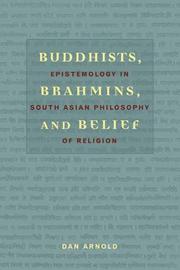| Listing 1 - 3 of 3 |
Sort by
|
Book
ISBN: 9781443816656 1443816655 1443897760 9781443897761 Year: 2016 Publisher: Newcastle upon Tyne
Abstract | Keywords | Export | Availability | Bookmark
 Loading...
Loading...Choose an application
- Reference Manager
- EndNote
- RefWorks (Direct export to RefWorks)
Mimamsa. --- Hindu philosophy --- Hinduism
Book
ISBN: 1283551039 9786613863485 9004230246 9789004230248 9789004222601 900422260X Year: 2012 Publisher: Leiden ; Boston : Brill,
Abstract | Keywords | Export | Availability | Bookmark
 Loading...
Loading...Choose an application
- Reference Manager
- EndNote
- RefWorks (Direct export to RefWorks)
The book is an introduction to key concepts of Indian Philosophy, seen from the perspective of one of its most influential schools, the Prābhākara Mīmāṃsā, which flourished from the 7th until the 20th c. AD. The book includes the critical edition and translation of Rāmānujācārya's Śāstraprameyapariccheda, which is part of his Tantrarahasya (written in South India, after the 14th c.). This text has never been translated before and it is one of the clearest elaboration of the Prābhākara thought. The book particularly aims at presenting the linguistic, deontic-ethic, hermeneutic and epistemo-logical thought of the Prābhākara Mīmāṃsā. Detailed glossary and indexes make it possible to use the book as a reference-tool for Indian philosophy and linguistics.
Mimamsa. --- Hindu philosophy. --- Philosophy, Hindu --- Philosophy --- Philosophy, Indic --- Hindu philosophy --- Hinduism --- Rāmānujācārya, --- Rāmānujaācārya, --- Ramanujaacarya,

ISBN: 0231132808 0231132816 0231507798 9780231507790 9780231132800 9780231132817 Year: 2005 Publisher: New York Columbia University Press
Abstract | Keywords | Export | Availability | Bookmark
 Loading...
Loading...Choose an application
- Reference Manager
- EndNote
- RefWorks (Direct export to RefWorks)
In Buddhists, Brahmins, and Belief, Dan Arnold examines how the Brahmanical tradition of Purva Mimamsa and the writings of the seventh-century Buddhist Madhyamika philosopher Candrakirti challenged dominant Indian Buddhist views of epistemology. Arnold retrieves these two very different but equally important voices of philosophical dissent, showing them to have developed highly sophisticated and cogent critiques of influential Buddhist epistemologists such as Dignaga and Dharmakirti. His analysis-developed in conversation with modern Western philosophers like William Alston and J. L. Austin-offers an innovative reinterpretation of the Indian philosophical tradition, while suggesting that pre-modern Indian thinkers have much to contribute to contemporary philosophical debates.In logically distinct ways, Purva Mimamsa and Candrakirti's Madhyamaka opposed the influential Buddhist school of thought that emphasized the foundational character of perception. Arnold argues that Mimamsaka arguments concerning the "intrinsic validity" of the earliest Vedic scriptures are best understood as a critique of the tradition of Buddhist philosophy stemming from Dignaga. Though often dismissed as antithetical to "real philosophy," Mimamsaka thought has affinities with the reformed epistemology that has recently influenced contemporary philosophy of religion.Candrakirti's arguments, in contrast, amount to a principled refusal of epistemology. Arnold contends that Candrakirti marshals against Buddhist foundationalism an approach that resembles twentieth-century ordinary language philosophy-and does so by employing what are finally best understood as transcendental arguments. The conclusion that Candrakirti's arguments thus support a metaphysical claim represents a bold new understanding of Madhyamaka.
Knowledge, Theory of (Buddhism). --- Knowledge, Theory of. --- Mādhyamika (Buddhism). --- Mimamsa. --- Mādhyamika (Buddhism). --- Knowledge, Theory of (Buddhism) --- Mādhyamika (Buddhism) --- Epistemology --- Theory of knowledge --- Central philosophy (Buddhism) --- Chūgan shisō --- Mādhyamikaśāstra --- Middle doctrine school (Mahayana Buddhism) --- Middle school (Mahayana Buddhism) --- Sūnyavāda (Buddhism) --- Buddhist epistemology --- Theory of knowledge (Buddhism) --- Philosophy --- Psychology --- Buddhist philosophy --- Mahayana Buddhism --- Hindu philosophy --- Hinduism --- Buddhism --- Doctrines --- Mγ¹dhyamika (Buddhism)
| Listing 1 - 3 of 3 |
Sort by
|

 Search
Search Feedback
Feedback About UniCat
About UniCat  Help
Help News
News